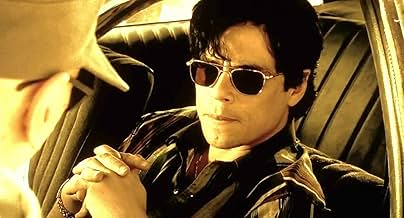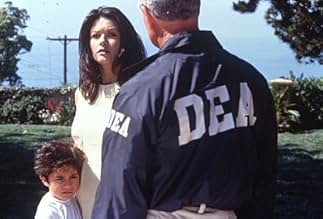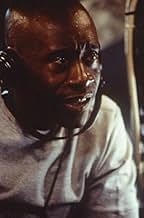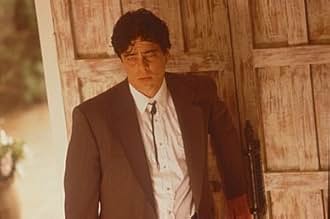O presidente nomeia um juiz conservador para liderar a crescente guerra às drogas nos EUA, apenas para descobrir que sua filha adolescente é viciada em crack.O presidente nomeia um juiz conservador para liderar a crescente guerra às drogas nos EUA, apenas para descobrir que sua filha adolescente é viciada em crack.O presidente nomeia um juiz conservador para liderar a crescente guerra às drogas nos EUA, apenas para descobrir que sua filha adolescente é viciada em crack.
- Direção
- Roteiristas
- Artistas
- Ganhou 4 Oscars
- 73 vitórias e 86 indicações no total
- Salazar Soldier
- (as Jose Yenque)
- …
- Direção
- Roteiristas
- Elenco e equipe completos
- Produção, bilheteria e muito mais no IMDbPro
Avaliações em destaque
That the war on drugs cannot be won, and is hypocritical to boot, is a message that needs as much air-time as it can get.
"Traffic" caught some of the most gratifying praise in the year 2000. Does the production live up to its expectations? To some extent. It is not a movie to take the family to on a Sunday afternoon, nor is it an "entertaining" popcorn extravaganza. "Traffic" is one of the best films of the year, but it is not a movie for everyone. I had my fair share of disappointments, and I think many audiences will walk away unsatisfied by its documentary-like style and unusual structure. "Traffic" is still a great achievement in filmmaking and visual style-worthy of some, but not quite all, of its great acclamation.
The movie's director, Steven Soderbergh, won Oscar nominations for both of his movies last year: "Erin Brockovich" starring Julia Roberts, and this epic about the never ending war on drugs. That first film is entertaining and charming, but this is far more complex in its story. There are actually three separate plots here, the first detailing two Tijuana cops (Benicio Del Toro and Jacob Vargas) who find themselves in the middle of a corrupt police force, working for Gereal Arturo Salazar (Thomas Milian), Mexico's top drug aggressor who wants to shut down the Tijuana drug cartel by capturing a notorious assassin (Clifton Collins Jr.).
The second story has Michael Douglas as a conservative Ohio State Supreme Court Judge turned nation's new drug czar. He has a savage job, as we can see, but it is even more difficult being the father of a 16-year-old daughter (Erika Christensen), who gets straight A's in school, but uses heavy drugs and eventually prostitutes herself for them when the supply runs low. Amy Irving plays her mother whom herself tried every kind of drug in the market when she was young and thinks her daughter should be given more freedom in this area of maturing. Her husband strongly disagrees.
The third story is a bit more complicated, dealing with the reactions of a typical pregnant homemaker, Helena (Catherine Zeta-Jones), when she finds out her husband, Carlos Ayala (Steven Bauer), is not an executive, but a high-powered drug lord. He is taken into custody when undercover DEA agents Montel Gordon (Don Cheadle) and Ray Castro (Luiz Guzman) crack a disreputable drug cartel led by Juan Orbergon (Benjamin Bratt). Helena, with the help from her attorney (Dennis Quaid), must deal with the pressures by her husband's demanding enemies, as well as the DEA. Miguel Ferrer plays the middle-run drug dealer who is captured by the DEA agents and wants immunity for testifying against the high-powered bosses for whom he works.
"Traffic" does not have the harrowing, compassionate, hard-to-watch tone that "Requiem for a Dream" had earlier last year, which also contained three different although parallel stories. That film depicted drug use as personal success followed by desolation and punishment. "Traffic" doesn't really make drugs personal, although the plot featuring Michael Douglas' drug addicted daughter touches on the idea, and the actors do a good job of making the character's attitudes hit home, but the film is more about the war on drugs within America as a country, and how it is a battle not likely to be won anytime soon. The picture does not capture the feeling of the characters like "Requiem for a Dream" did with its highly elaborate styles and camera effects. "Traffic" just isn't as emotionally profound as the much more worthy "Requiem for a Dream."
Steven Soderbergh does manage to capture an inciting style with grainy, high contrast photography exploring the atmosphere of Mexico. He pays attention to even the smallest scenes. Take a scene where the Benicio De Toro character encounters a young married couple who complain about their stolen car. Many directors would have left this scene on the editing tables, or paid less courtesy to it because it is not as important as many other scenes. He gets the right mood, confusion of the characters, all while furthering the development of De Toro's character. Each individual scene here is interesting on its own merit.
A top notch cast contributes superb performances in "Traffic." We expect and receive good performances from actors like Michael Douglas, Amy Irving, Dennis Quaid, Benicio Del Toro, and Albert Finney, but there are also some newcomers who shine with their material, including Erika Christensen and Topher Gracer. The actors really hold our attention, and with a running time of nearly 150 minutes, that is imperative. This film is greatly constructed and perfectly cast-it is the kind of movie in which you walk out of the theater wanting to discuss your opinions about it.
Stylistically, this film represents a major breakthrough. Soderbergh shot the film himself (under the pseudonym Peter Andrews) and Traffic takes all of his past experiments with color, available light, and hand-held work light-years beyond The Limey and Out of Sight. He has created a brilliant style that could best characterized as expressionistic naturalism. His loose hand-held style lends the film an extremely spontaneous realistic tone, but the modifications of color amplify the drama. Each storyline has its own distinct look that accentuates the emotions underlining the film. (The Mexico story involving Benicio Del Toro is told in earthy saturated yellows, the story of Michael Douglas and his daughter Erika Christensen is told in an aquarium blue, while the Catherine Zeta-Jones, Luis Guzman-Don Cheadle story gets a natural available light look). In addition to being visually striking and cool in a completely unpretentious manner, Soderbergh's camera technique transcends mere virtuosity and actually becomes another character in the film. As usual with Soderbergh, the film is edited with musical verve and skill, where time is collapsed and expanded, and characters are seen reflecting on past actions.
I've been remiss in not discussing the acting earlier. This film has an amazing ensemble cast where everybody is working at the top of their game. However, Benicio Del Toro definitely stands out with the breakthrough performance. I don't think it's accidental that the movie begins and ends with shots of him. He plays Javier Rodriguez, a Mexican police officer caught in a futile and corrupt system, and it's as compelling of a character as Michael Corleone. Del Toro is exceptionally relaxed and subtle, keeping his thoughts and feelings private from the other characters in the films, but sharing it with the camera. Del Toro navigates the audience through a world of impossible choices and moral corruption, quietly simmering with intense conflict just beneath the surface. Benicio's been an indie stalwart for years, but this film should shoot his stock through the roof. If there's justice in this world, he'll be rewarded with Best Actor Awards aplenty.
Michael Douglas is also terrific, adding another strong performance to his gallery of flawed men in power. He shows genuine fear and vulnerability in a harrowing scene in which he searches for his daughter in a drug dealer's den. I've never seen Erika Christensen before, but she makes an impressive debut. Don Cheadle and Luis Guzman (they should star as a team in every movie!) are as loose, limber and spontaneous as ever, providing plenty of comic relief as well as keeping it real. Catherine Zeta-Jones takes a complete 180 from her past roles and admirably plays against her looks, appearing very pregnant while thrown into gritty surroundings. Dennis Quaid is appropriately slimy as a corrupt lawyer.
Anyway, film geeks and anybody else starved for a genuine piece of filmmaking should breathe a sigh of relief and give thanks that Soderbergh has come to save the day.
`Traffic' takes a look at the world of drugs through the stories and lives of different characters. Some are loosely connected to one another; some are not. There is the story of Javier Rodriguez (Benicio Del Toro), a Mexican policeman struggling to keep his distance from the corruption that seems to follow him everywhere; there is the story of Ray Castro (Luis Guzman) and Montel Gordon (Don Cheadle), two DEA agents trying to turn the low-level drug dealer Eduardo Ruiz (Miguel Ferrer) against his drug cartel boss; there's the story of Helena Ayala (Catherine Zeta-Jones), the unsuspecting wife of the drug cartel boss who suddenly learns who her husband really is and what he does for a living; and then there's the new head of the DEA, Robert Wakefield (Michael Douglas), a man so wrapped up in his mission to stop the war on drug, he fails to notice that his own daughter Caroline (Erika Christensen) is becoming addicted to crack. Much like in the real world, the events of each story directly or indirectly affect the events of the others, leaving all the characters to consider their roles in the drug culture . . . and what, if anything, they can do to change those roles.
In terms of story, `Traffic' is absolutely brilliant. I'm still amazed that the film could cover so many plotlines and dozens of characters so effortlessly. Each story -- whether it's Helena assuming the role of her drug-dealing husband, or Robert canceling DEA meetings so he can deal with his drug-addicted daughter -- is powerful and brutally honest. `Traffic' isn't afraid to look at tough or uncomfortable issues. `Traffic', somewhat surprisingly, never preaches, either -- while it's safe to say that the message of the film is essentially anti-drug, it never comes out and outright says that message. A lesser film would've had some grandiose speech imbedded somewhere in the film denouncing the use of drugs -- not `Traffic'. It's wise enough to let the viewer take what messages they want from the film, without ever preaching. (A minor quibble -- did Michael Douglas' character really have to be the new drug czar of the United States? The fact that he was the top law enforcement drug official in the U.S., and that his daughter was addicted to drug . . . well, it seemed a little too far-fetched, and a little too movie-like. If Mr. Douglas had been playing ONE of the top drug officials in the federal government, instead of THE top official, I would've found his character to be infinitely more believable.)
Soderbergh's also at the top of his game with his direction of `Traffic'. The film is virtually filmed entirely with hand-held camera, giving each and every scene an up-close-and-personal feel. There's also a distinct lack of background music, which lets the viewer feel like they're eavesdropping on real-life scenes, and not just watching a movie. These techniques make for a very personal, intense experience. Soderbergh also uses a technique he's used in some of his other films (Out of Sight, Erin Brockovich) -- certain scenes are filtered a specific color, to heighten a mood or a sense of awareness of what's about to happen. The scenes in Mexico featuring the Mexican detective Javier, for example, are all filmed in a very bright, almost disorienting yellow. It's a technique that can be irritating at times, but for the most part, it serves a bold purpose that truly adds to the film.
As for the characters, and the acting . . . jeez, `Traffic' is without a doubt one of the best-cast films of all time. I mean it. There are no weak links, no poorly written characters, and no badly played characters. Each and every character adds something significant to the story in `Traffic', and each and every actor is outstanding. Kudos must go to possibly one of the best ensemble casts of all time. Three actors in particular stand out, though -- Benicio Del Toro (who won the Best Supporting Actor Oscar for his performance), Don Cheadle (who was actually slightly better than the brilliant performance of Mr. Del Toro, IMHO), and Catherine Zeta-Jones. I'm normally loathe to use the word `flawless' when describing a film, but the casting of `Traffic' was indeed flawless.
`Traffic', with its unflinching look at drug use in America today, can be uncomfortable at times to watch. It certainly can't be termed a `happy' or a `feel-good' film. That doesn't change the fact that it is an amazing, thought-provoking, powerful film -- and without a doubt the best film released in the year 2000. I can't recommend this film enough. Grade: A
Você sabia?
- CuriosidadesThe scene in which Michael Douglas takes his trip to the California border crossing to discuss drug interdiction was actually shot at the Tijuana crossing. The video and sound quality are so low in part because it wasn't intended to be part of the movie. Douglas, out of character, started asking Rudy M. Camacho about drug trafficking on the border. At the time, Camacho was the real-life Customs chief in charge of the California border crossings. Steven Soderbergh began filming it with a hand-held camera, praying that Camacho wouldn't address the actor as "Mr. Douglas".
- Erros de gravaçãoFrancisco Flores has distinctive wounds on his left cheek and forehead when first shown in surveillance photos, but those wounds are only visible after he is tortured by General Salazar's men, long after the photos were taken.
- Citações
General Ralph Landry: You know, when Khruschev was forced out, he sat down and wrote two letters and gave them to his successor. He said - "When you get yourself into a situation you can't get out of, open the first letter, and you'll be safe. When you get yourself into another situation you can't get out of, open the second letter". Well, soon enough, this guy found himself into a tight place, so he opened the first letter. Which said - "Blame everything on me". So he blames the old man, it worked like a charm. He got himself into a second situation he couldn't get out of, he opened the second letter. It said - "Sit down, and write two letters".
Robert Wakefield: [laughs] Yep.
- Cenas durante ou pós-créditosThere are no opening credits except for the film's title in the lower left corner.
- Versões alternativasThe Criterion Collection DVD is presented in 1.85:1, whilst the Criterion Blu-ray is presented in 1.78:1. According to the Blu-ray insert, the latter is the director's preferred ratio.
- Trilhas sonorasGive The Po' Man A Break
Written by Fatboy Slim (as Norman Cook)
Performed by Fatboy Slim
Courtesy of Astralwerks Records
Principais escolhas
Detalhes
- Data de lançamento
- Países de origem
- Idiomas
- Também conhecido como
- Tráfico
- Locações de filme
- Empresas de produção
- Consulte mais créditos da empresa na IMDbPro
Bilheteria
- Orçamento
- US$ 48.000.000 (estimativa)
- Faturamento bruto nos EUA e Canadá
- US$ 124.115.725
- Fim de semana de estreia nos EUA e Canadá
- US$ 184.725
- 31 de dez. de 2000
- Faturamento bruto mundial
- US$ 207.515.725
- Tempo de duração2 horas 27 minutos
- Cor
- Mixagem de som
- Proporção
- 1.85 : 1





































